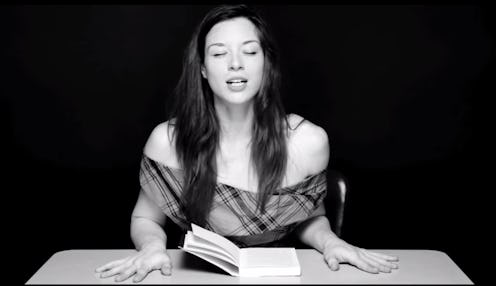
It begins innocuously enough: a woman is seated at a table. She states her name and the piece of literature she’s chosen to read aloud, and she begins her recitation. But a couple of minutes (or seconds) in, things start to get interesting. She squirms, she giggles, her breath catches. She keeps reading. She gasps. She keeps reading. She puts her book down. She orgasms. She states her name and the piece of literature she’s just read, still catching her breath. This isn't your typical reading series: this is Clayton Cubitt’s Hysterical Literature project. And it's art.
Beginning on January 24, the New York-based artist’s work will be on view as a part of Mass MoCA’s Bibliothecaphilia exhibition. The mixed-media exhibit aims to excavate the accessible sacredness of libraries, “institutions straddling the public and private spheres,” while also evaluating the relevance of these “physical and philosophical” retreats in the digital age.
Although the exhibit features work from five other artists, it’s Clayton Cubitt’s series that’s likely to draw the most attention and criticism — it’s already gotten a lot of both since Cubitt first launched the series, all of which you can watch on Cubitt’s YouTube channel, in 2012. Each of the nine videos shows women (among whom include an adult performer, a burlesque dancer, and several artists) reading their literature of choice while, under the table, “an unseen assistant distracts them with a vibrator.”
Hysterical Literature establishes a jarring tension between intimate and voyeuristic — it’s a tension that many artists seek to inspire in the viewer, but perhaps not so candidly as Cubitt’s project. And the repercussions of that guilty observer complex become even more heightened based on the series’ sheer accessibility, a condition that Cubitt chose precisely “for [YouTube’s] mainstream democratic nature.” You will inevitably binge-watch the entire series, an experience that becomes not unlike blindly marathon-ing a 23-minute sitcom.
But what about that other shamelessly voyeuristic viewing experience? Why does watching women orgasm while reading a book feel like consuming art, not like watching porn? According to Cubitt, “the project, while alluding to the sexuality of pornography, has none of its primary features: an objectification of the participants, a prurient focus on nudity and the genitals, a lack of intellectual focus as the primary purpose.” That the subject reads from her favorite piece of literature, too, renders the viewing experience kind of heartwarming. It doesn’t feel like exploitative click-bait: reading your favorite book and having sex (though not necessarily at the same time) are private, but egalitarian, experiences.
A few of the subjects wrote about their experiences participating in Cubitt’s performance art project-cum-reading series-cum (heh) social experiment. Stoya, who’s featured in the first session, explains her choice to read Supervert’s “Necrophilia Variations,” as well as her first experience with the Hitachi vibrator: “This section of the world that I’m inhabiting slows down, zooms in. Like a stretched rubber band it suddenly contracts, and I am lovingly punched with an orgasm.” And the artist Marne Lucas, who reads John Ashbery’s poem “Self Portrait in a Convex Mirror” in Session Nine, reflects on how the project challenges traditional attitudes toward sex in art: "I’ve found the art world to be titillated by bad behavior in artists, rewarding such personas, but that same art world is ultimately puritanical when it comes to the expression of sex, sex in art, and towards any artists, especially women, who are unashamed to participate intimately in their work."
Magic Wand Massager, $60, Amazon
While Hysterical Literature has certainly proven to be an effective standalone series (it’s collected over 30 million YouTube views), it’ll be interesting to consider in relation to the five other artists’ work at Mass MoCA. Because while the project brings up several artistic considerations — from the voyeuristic nature of portraiture to the representation of female sexuality — it also frankly addresses the experience of enacting what can be a very private ritual, like reading, in a public place, like libraries, Bibliothecaphilia's honored subject.
Images: Giphy (2); claytoncubitt/YouTube